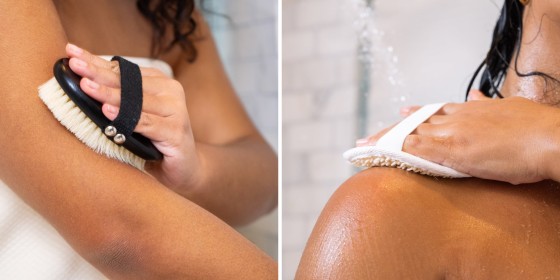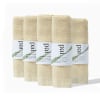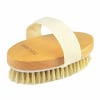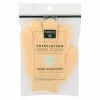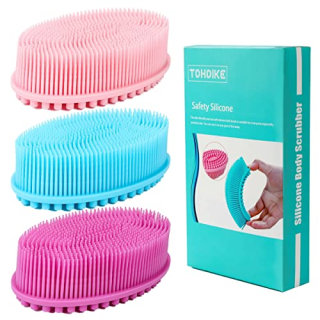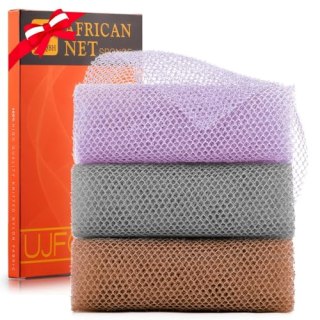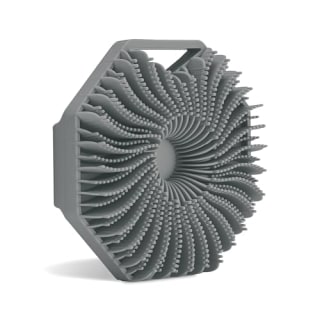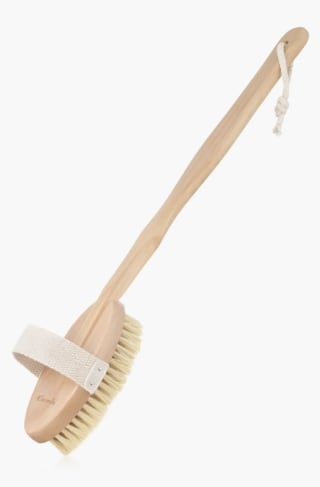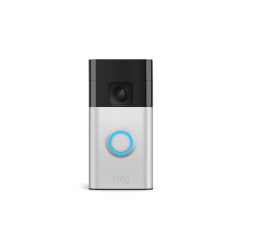If you’ve been using a synthetic or natural loofah, it might be time for an upgrade — preferably to something that doesn’t harbor loads of bacteria, according to dermatologists.
Yes, loofahs can help gently exfoliate your skin and provide a rich lather when paired with your body wash. However, there are some underlying risks. “In general, loofahs are not necessary to use in the shower and may come with associated risks [like] microtraumas on the skin and, if not properly cared for or replaced, can lead to the risk of mold or bacteria,” says Dr. Marisa Garshick, a board-certified dermatologist at MDCS Dermatology: Medical Dermatology & Cosmetic Surgery.
To help you find cleansing and exfoliating alternatives, I spoke to board-certified dermatologists to find out everything you need to know about looking for safer options.
How I picked the best loofah alternatives
Our dermatologists recommend using the following loofah alternatives, all of which are easier to clean and will generally harbor less bacteria than your typical loofah.
- Silicone scrub: Paired with your everyday body wash, these scrubs use silicone bristles to remove dead skin, dirt, excess oil and more from the skin, according to experts.
- Washcloths: Since washcloths are less abrasive than loofahs and reduce the chance of microtears on the skin, they can be a great option for all skin types.
- Exfoliating gloves provide a deeper exfoliation than your standard loofah and are great for targeting rough areas like elbows and knees, according to our experts.
- Dry brushes have dense bristles that can help exfoliate your skin before you get in the shower, says Dr. Rachel Westbay, a New York City-based board-certified dermatologist. Like exfoliating gloves, dry brushes are especially good to use on dry and rough areas of the body, experts told me.
Want more from NBC Select? Sign up for our newsletter, The Selection, and shop smarter.
The best loofah alternatives
Your hands are the safest option when it comes to cleansing your skin in the shower, but you can also try one of these expert-approved alternatives.
Best silicone scrub
This silicone body scrub is a gentle alternative if you're looking to throw out your loofah. “[It’s] both easy to use and easy to clean, helping to provide a lather while still being gentle on the skin,” says Garshick. One side has long silicone bristles, while the other side gently massage and cleanse the skin, according to the brand. This pack has three scrubs, so you can replace them when you need, says Garshick. Generally, a silicone scrub will last around 6 months or longer before you need to replace it, according to experts.
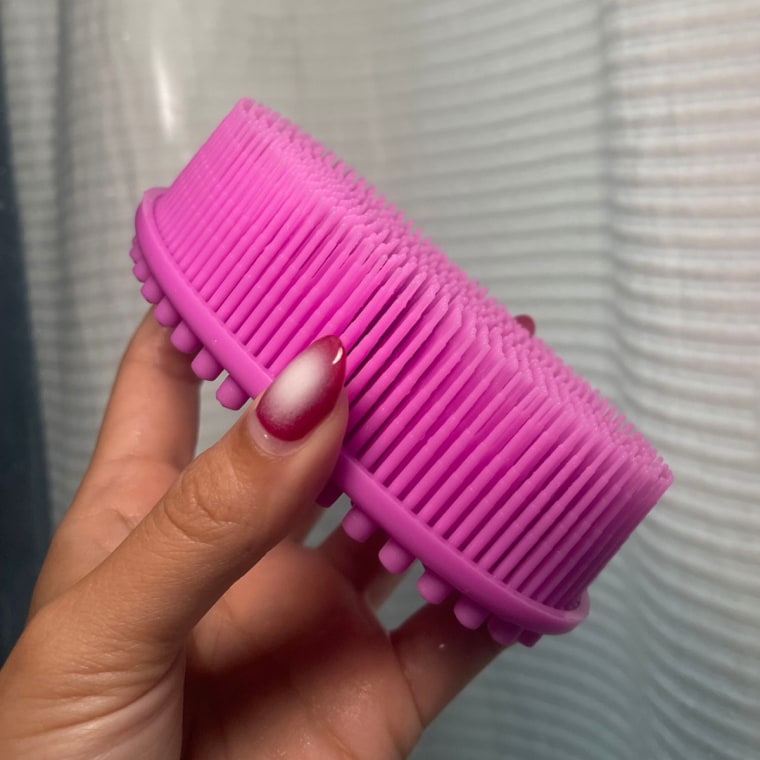
Best washcloth
This washcloth is suitable for all skin types, including those with sensitive skin, according to the brand. The dual-sided cloth, made of 100% cotton, has a muslin side to gently exfoliate the skin, while the other side is made of terry flannel to help cleanse the skin, according to the brand. Plus, you can wash and reuse them time and time again, according to the brand.
Best net sponge
These sponges are a hybrid of washcloths and exfoliating gloves. “Net sponges provide a gentle — keyword: gentle — type of physical exfoliation that has made my skin softer with consistent use,” says NBC Select SEO editor Nikki Brown. “I also find them less germy and easier to take care of than washcloths or loofahs.” To wash, she dabs a bit of laundry detergent on it, gently scrubs it in the sink with cold water and then lets it air dry. You can also sanitize them by placing them in the washing machine, according to the brand.
Best exfoliating gloves
If you want to exfoliate rough areas of the body like your feet or elbows, consider using these gloves, They’re made of textured nylon to remove dead skin cells and dirt, according to Earth Therapeutics. After using the gloves in the shower, be sure to rinse them out, remove excess water and hang dry. You should replace them every three months, according to the brand.
Best dry brush
Unlike a loofah, which you typically use while you’re bathing, dry brushes are an alternative to use before you step foot in the shower. This brush uses natural boar bristles to help exfoliate the skin, and it even has a cotton strap to help maintain a steady grip as you work the dry brush across your body, according to the brand.
Easiest to hold
This silicone scrubber has soft, textured ridges that gently exfoliate the skin. NBC Select updates editor Mili Godio uses the Sud Scrub to massage her favorite body wash into her skin when she showers. “It’s super gentle and I never feel like my skin is raw or irritated after using it, which happens a lot with other body scrubbers,” says Godio. “I also love the hand strap, so it doesn’t slip out of my hand when I’m using it.” The scrubber is antimicrobial, doesn’t hold odor and has a hanging strap for easy storage.
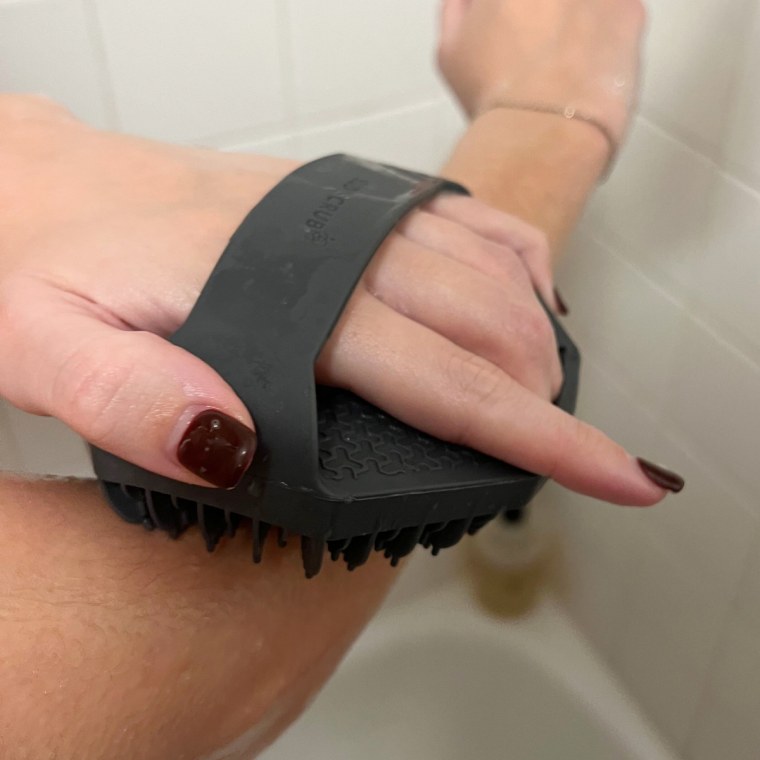
Best for hard-to-reach places
Dermatologists recommend this option because of its soft bristles, detachable handle and hand strap, which makes it easy to focus on specific areas of the body and target hard-to-reach spots, according to experts in our guide to dry brushing. To prevent bacteria from accumulating and growing on the brush, store it in a dry place (not in the bath or shower) and use the brush without any product on it, according to the brand.
What can you use instead of a loofah?
Deciding which product to use in the shower is based on your personal preference. However, there are some factors that our experts recommend considering, like your skin type and how easy each product is to clean.
Hands
Most dermatologists recommend simply using your hands to lather your body wash and exfoliate because it’s hygienic and isn’t as likely to cause injury to the skin, according to Westbay.
“Using clean hands to wash your body is the most affordable, accessible and gentle option to wash the body,” says Garshick. “To get the benefits of exfoliation, it is possible to use an exfoliating cleanser.”
If you want to up your exfoliating game, consider using a body wash with chemical exfoliants like gentle alpha hydroxy acids, or a physical exfoliant like a scrub and apply it gently with your hands, says Westbay.
Silicone scrubs
Silicone scrubs are gentle enough for sensitive skin and are ideal for cleansing without being harsh or abrasive, according to Garshick. This type of bath product is durable and doesn’t trap bacteria or mold, making it more hygienic and easier to clean. Since it doesn’t harbor bacteria, it’s especially good for those with dry or sensitive skin, says Garshick.
Washcloths
If you have sensitive skin, consider using a washcloth since it cleans the skin without being too harsh or abrasive, according to Garshick. “A washcloth can help apply the body wash to the skin,” says Garshick. However, it’s best to avoid combining an exfoliating wash or scrub with a washcloth because it may be too rough for the skin, she says.
Like loofahs, washcloths can still harbor bacteria, though they tend to be easier to clean, says Garshick. You should clean your washcloths regularly (two to three times a week or after each use if visibly dirty) and should be thrown out after some time. If you maintain and clean your washcloth frequently, they can last up to two years.
Exfoliating gloves
Exfoliating gloves may be more exfoliating compared to loofahs, especially on thickened, rough areas of skin like knees, elbows and feet, says Westbay. However, because they are rougher on the skin, exfoliating gloves can cause microtears, according to our experts.
In terms of how it compares hygienically, exfoliating gloves are reusable, easier to clean and accumulate less bacteria compared to loofahs, according to Westbay.
Dry brush
If you have oily skin, consider using a dry brush on your body since it can help remove any buildup of dead skin and unclog pores, according to our experts. However, keep in mind that a dry brush can be more abrasive on the skin when compared to loofahs, says Garshick.
“I would consider them, overall, to be a higher risk of microinjury to the skin but a lower risk of microbial contamination,” says Westbay. “A dry brush accumulates bacteria less easily than a loofah, but that is not to say that using one hygienically and following proper cleaning is not necessary.”
What to know about your loofah
If you do decide to continue using your loofah, here are a few things to remember, according to Garshick.
- Proper use and cleaning. In order to prevent microbial growth, it is essential to regularly clean and replace your loofah. The frequency will depend on the type of loofah — for example, a natural loofah (which refers to ones that are made up of natural fibers, which may be derived from the luffa aegyptiaca plant) should be replaced every three to four weeks, while your standard plastic one can last for up to three months.
- Don’t be rough with it. While it may be tempting to achieve a deep clean by using a rough exfoliating product like your loofah to get dead skin and dirt off, it’s best to be gentle when using it on your skin to avoid any microtears or injury.
- Be aware of your skin type. Although loofahs may seem like a universal product suitable for all skin types, some individuals need to be extra cautious if they want to continue using one. Those with dry or sensitive skin should be especially cautious not to rub too vigorously or apply too much pressure to minimize any potential trauma to the skin.
- Check the material of your loofah. It is best to look for loofahs made of antimicrobial materials to reduce the potential of bacterial overgrowth. Consider antimicrobial options made of natural sea sponge or silicone material, according to our experts.
Meet our experts
At NBC Select, we work with experts who have specialized knowledge and authority based on relevant training and/or experience. We also take steps to ensure all expert advice and recommendations are made independently and without undisclosed financial conflicts of interest.
- Dr. Marisa Garshick is a board-certified dermatologist at MDCS Dermatology: Medical Dermatology & Cosmetic Surgery in New York and New Jersey. Her areas of expertise include pediatric and adult dermatology and cosmetic dermatology.
- Dr. Rachel Westbay is a board-certified dermatologist at Marmur Medical in New York City. Her areas of expertise include general and cosmetic dermatology, like injectables and other non-invasive procedures.
Why trust NBC Select?
Bianca Alvarez is a former associate reporter at NBC Select, where she covered beauty, including how to build a skin care routine, exfoliating 101 and blackhead treatments. For this piece, she interviewed dermatologists and researched many loofah alternatives on the market. She also recommended products the dermatologists shared with her and that align with their shopping guidance.
Catch up on NBC Select’s in-depth coverage of tech and tools, wellness and more, and follow us on Facebook, Instagram, Twitter and TikTok to stay up to date.

